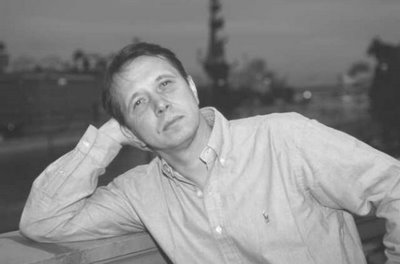
I've never heard him live, but I think that Mikhail Pletnev's performing persona may remind one of
another slightly eccentric player. Renaud Machart reviewed a recent Pletnev concert (
Le récital au rasoir du pianiste Mikhaïl Pletnev, March 10) in Paris for
Le Monde (my translation):
The pianist (and conductor) Mikhail Pletnev (age 49, winner of the First Prize at the International Tchaikovsky Competition in 1978) takes the stage like an absolutely lunatic Pierrot, raised shoulders, swinging arms, as if held up and moved by the strings of a marionnettiste hidden in the wings of the Théâtre des Champs-Elysées. He was supposed to play Chopin. Tonight, it will be Mozart and Schumann. Mikhail Pletnev does what he wants, and no one dreams of correcting him. His world is sealed in strangeness, which is nevertheless not an aesthetic, a system, because he seems to be ruled by the inspiration of the moment. Pletnev does the inverse of what others do, but he never seems to believe that he is more interesting that what he plays. There is something childlike, natural, and yet perversely playful in the way he opens up the motor of a Mozart sonata, to take it apart and put it back together backwards. [...]
In the [Schumann] Kreisleriana, op. 16, "fantasies" in the phantasmagoric sense of the word, Pletnev created a dream landscape so strange that it was at the edge of autism. When one got back home, one was tempted to consult the score in order to verify that what one heard was indeed written down. For example, at the end of the penultimate piece, Pletnev's keyboard (a Blüthner piano) managed to create the perfect illusion of an organ heard in the distance, in a closed and lonely chapel; when the motif came back, it was at the same distance, the same chapel, the same organ, but heard through the opened door. Few even understand that acoustic refinement, let alone know how to create it. That is why Mikhail Pletnev is considered by his peers as one of the greatest living pianists. That is why this recital, cruel and beautiful, was one of the strongest ever heard.
One of the Mozart sonatas that Pletnev played on this concert was K. 330, which we
heard last Friday from Krystian Zimerman at Shriver Hall.
 I've never heard him live, but I think that Mikhail Pletnev's performing persona may remind one of another slightly eccentric player. Renaud Machart reviewed a recent Pletnev concert (Le récital au rasoir du pianiste Mikhaïl Pletnev, March 10) in Paris for Le Monde (my translation):
I've never heard him live, but I think that Mikhail Pletnev's performing persona may remind one of another slightly eccentric player. Renaud Machart reviewed a recent Pletnev concert (Le récital au rasoir du pianiste Mikhaïl Pletnev, March 10) in Paris for Le Monde (my translation):
(I know you didn't actualy compare them, but let me go off on this, anyway:)
ReplyDeleteI like Say... but comparison to Pletnev is not warranted. Or at least not in my book. Say - and I may be stretching readers' tolerance for metaphore here - is eccentric in the way that a college frat-boy is, who has succeeded making furniture of empty pizza boxes; Pletnev sits on chairs that are bizzare and weirdly entrancing ivory carvings. (And sometimes he just plays perfectly normal.)
The way Pletnev can make his piano do whatever he wishes (I've only gotten a little taste of that during his Brahms cto. last year - but on recording one can gather quite a bit of that, too), Pletnev becomes an extension of the piano to present all its possible colors and shades. With Say, the other way around.
Good point, Jens, and a fun poetic image to make the point: furniture made out of pizza boxes.
ReplyDelete